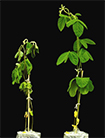Scientists have identified a chemical that helps plants better tolerate drought conditions, a discovery they say could help boost crop production as extreme weather
conditions become more common. After testing thousands of different molecules, researchers at the University of California, Riverside found and named a chemical, quinabactin, that caused the pores, or stomata, in Arabidopsis plants to close firmly, thus preventing water loss. The action is similar to the way a naturally occurring stress hormone, known as abscisic acid (ABA), performs in drought-tolerant plant varieties. While it was previously known that ABA triggers the closing of stomata pores during dry periods, the hormone is far too expensive to apply in agricultural fields, scientists say. Writing in the Proceedings of the National Academy of Sciences, the researchers report that the synthetic chemical mimics the effects of ABA but is much simpler chemically and cheaper to produce.
Click to enlarge
Cutler Lab/UC Riverside
Soybean plant, right, treated with quinabactin